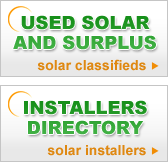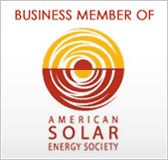
|
Georgia residential solar energy incentivesClean energy tax credit This tax credit is equal to 35% of the total cost of the equipment including installation. The maximum credit for clean energy systems are as follows: $2,500 for domestic solar water heating Taxpayers who wish to claim this credit must submit an application for approval and all equipment must meet all certifications standards. Georgia Power – Solar buy back program This program is for system owners who wish to sell to Georgia Power
all the power generated by an eligible system that is connected to
the grid. This power is then sold to other customers. Georgia Power purchases electricity from PV systems for 17.74 cents per kWh, up to 500 kW which is higher than the standard net metering rate. Customers who wish to participate in the solar buy back program must fill out a generation contract with Georgia Power and must be connected to the grid. Systems must meet all qualifying and safety standards specified. TVA – Green power switch generation partners program This is a production based incentive program for Tennessee Valley Authority customers who wish to install solar photovoltaics. Other qualifying systems in this program include wind, biomass and hydropower systems. In this program TVA owns all rights to any renewable energy credits. Participating power companies purchase the generated power from TVA. Customers receive their incentives through a participating utility where the system is located through a credit on their monthly bill. All participants in this program receive $1000 upfront to off set the initial cost of the system from TVA. After that, TVA will purchase the output of the system for $0.12 per kWh above the retail rate for solar and $0.03 per kWh above the retail rate for all other systems. Systems must have a minimum output of 500 watts AC and a maximum output of 999 kilowatts. Utility rebate programs Georgia has a few different rebate programs provided by provided by municipal cities and utility companies. Most of the rebate programs are for solar photovoltaics and solar water heat. Rebates are either given as a one time set amount for the initial cost and installation of a system, other rebates are given per kilowatt up to a specified amount. Residential renewable energy tax credit This personal tax credit allows the taxpayer to claim a credit of 30% of expenditures including labor costs and installation of qualified residential solar-electric systems, solar water heating systems or fuel cells. Small wind-energy systems and geothermal heat pumps can also be accredited for. Solar-electric systems and solar water heaters have a maximum incentive of $2,000 if placed in service before 2009. There is no maximum incentive for systems placed after 2008. The excess amount of the federal tax credit may be carried forward to the next taxable year if it exceeds tax liability. This can be carried forward until 2016, but after that, it is unknown if the unused credit will be able to be forwarded. Residential energy conservation subsidy exclusion This is a personal exemption of 100% of energy conservation subsidies provided by public utilities. The value of a purchase or installation of any energy conservation measure by a customer such as solar water heat, solar space heat or photovoltaics will not be included in the customer’s gross income. Customers of an electric utility company, who participate in the utility’s energy conservation program, may receive a rate reduction of electricity furnished or a nonrefundable credit against the purchase price of the electricity on each monthly electric bill. Energy-efficient mortgages This is a federal loan program where homeowners can use EEM (energy-efficient
mortgages) to finance renewable energy technologies in a home.  |






